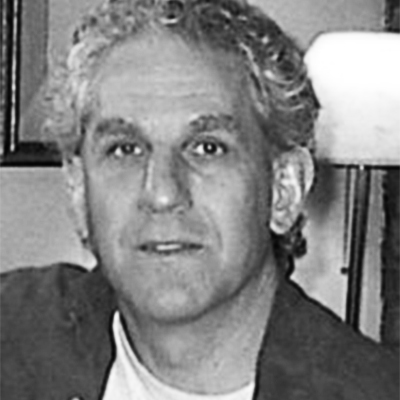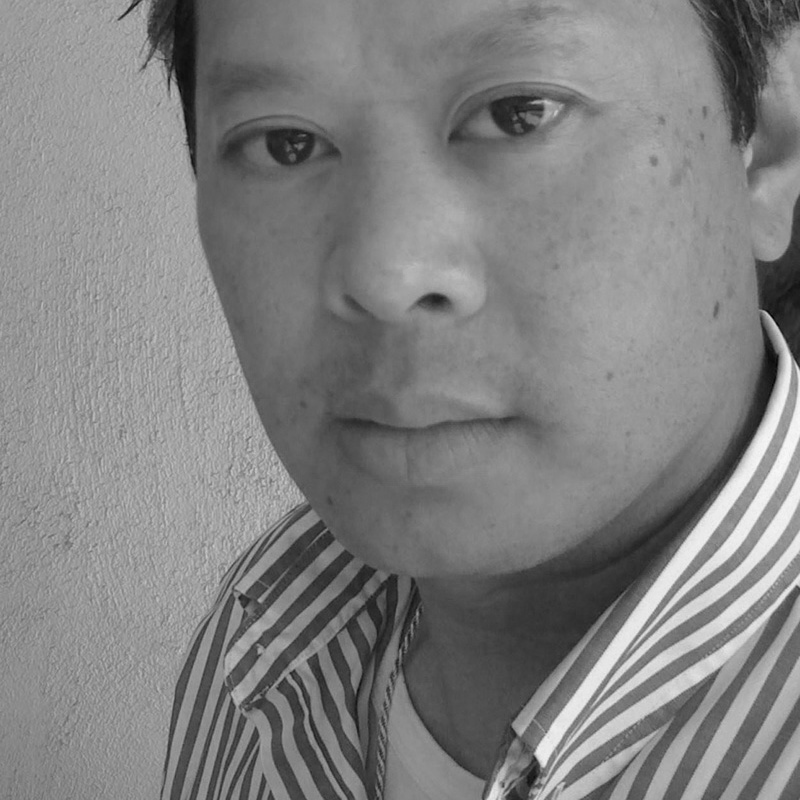Johnny was coming around the bend of a path through the park woods when he saw an old man on his hands and knees in a bright clearing up ahead.
Without thinking to, he stopped. Sophie, his spaced-out dog, kept on toward the man, not looking where she was going, weaving from smell to smell, off and on the path, pushing into low branches and briars, turning up leaves, oblivious as usual. Though she was devoted to Johnny, Sophie took no interest in other people or other dogs or wild animals just in smells as if her breed had lost something way back and it was her sole mission in life to find it again. True to form, she cantered, up on her toes, right past the man. He was not what she was looking for.
Johnny felt a thrill at seeing the guy. He wanted things to happen; he didn’t care what, just something. His life had become dull and he regarded each new person or situation as a door that might be thrown open onto a more exciting future. Or if not that, it would at least give him a story to tell on a date. He was tired of repeating himself on dates.
This can’t be good. Maybe the old guy’s been mugged or he’s having a heart attack. He hoped he wasn’t drunk, the usual, another pathetic lost soul.
Without wishing the man any harm, Johnny wanted to help or rescue him since there were few reasons for someone to be down on all fours which didn’t involve trouble, even lost keys. This was a lingering remnant of a desultory childhood of wandering alone in a semi-urban woods akin to this one, imagining himself a hero. Coming to the park every afternoon was a familiar ritual as if he was searching like Sophie for something lost a long time ago. Johnny often puzzled at how the woods made him feel peaceful and sad, settled and unsettled, at home yet full of longing.
He started walking again. The old man was dressed in jeans, boots and a red flannel shirt, maybe an outdoor type which seemed one good thing at least. The shirt’s startling red color, aglow in the late afternoon sun, standing out as it did, reminded Johnny of something though he couldn’t think what.
“Excuse me, Sir,” he said, coming up and stopping. “Are you all right?”
“Sure,” said the man with a glance over his shoulder. “No need to worry. Just finishing up,”
Johnny noticed the man’s small shovel, looked like army issue from way back, and the two foot high sapling he had just planted and mulched.
The man was pretty old and not in that good shape. Frail now, he did give the impression of having been strong and fit once. He rose to his knees and then used the shovel as a crutch to try to get to his feet. Imminent accident was in the air and the thrill of rescue possible. Johnny was ready. The old man’s arm strained and trembled against the shaking shovel handle. He wobbled and was about to keel over when Johnny caught hold of his free arm as it flapped wildly for balance. He held the guy up and steadied him to his feet. Though the old man didn’t weigh much, his grip on Johnny’s forearm was surprisingly strong. That felt good, strength for strength, man to man. Johnny was one of those perpetual youths looking for a father in every older man he met. He accorded them immediate deference, while at the same time feeling his too transparent needs instantly lost him the respect he hoped to gain.
“Thanks.”
“Not a problem, Sir.”
The man had deep lines, a lifetime of expressions carved into his yellowish, grey face. Though he no longer filled out his clothes, giving his body a bent, feathery flimsiness, his face had thick, fleshy features, full lips, heavy jowls, plump, curled ears. His hair was wispy and windblown. The two looked at each other for a few quiet moments, something Johnny would never do with a man his own age. He noticed a flickering glint in the man’s otherwise vague, red-rimmed, brown eyes.
“If you don’t mind me asking, what were you doing down there?” Johnny said.
“Not at all. I just planted this pecan tree here.”
“Nice.”
“In twenty years, more or less, if all goes well, you’ll be able to pick nuts from it,” the old man said and moaned with pleasure. “Hmmm.”
Pecans are good. Love pecans and pecan pie. Planting trees is good. Old guy wants to plant a pecan tree. All good, Johnny thought but then felt sad and sorry for himself. Hope I’m not walking around here in twenty years, same as now, everything the same as now. I’ll be almost fifty years old.
Sophie came trotting up, having wandered and weaved so far ahead she had gotten worried and needed to come back. Now her head was up, no longer down smelling whatever, and her tail wagging because she needed to be petted and relieved of the anxiety of having been separated from her master.
“No offense, Sir, but I hope I’m not still around here in twenty years.”
“Places to go, huh? See the world. Young man like you. Can’t blame you.”
“Sorry, Sir,” Johnny said, realizing the guy would be lucky to last five much less twenty years. “That was a stupid thing to say. Thoughtless. Planting a tree, I think that’s great. But why a pecan tree? Peaches or apples, they’d ripen much sooner.”
“Turn around. You see that tree in among the others there, with the long dark green leaves, that’s a pecan tree too, the parent of this sapling.”
“Oh yeah?”
“Yeah. But it never had the chance to fruit out much because of all the other trees around it blocking the sun. Only a pitiful amount of nuts ever. I live up there, up that hill on the street bordering the park, so what I did was pick a few nuts, sprouted and grew them at home and this one made it into a strong sapling. Planted in this clearing with plenty of sun, it might make it, right across the path from its parent.”
“Wow, that’s wild. Whatever gave you that idea?”
“I had a dream one night told me to, so I did.”
“Today?” Johnny said, musing to himself so it sounded like a question.
“Sure, today.”
“No, I mean, I hardly ever come to this side of the park and, I don’t know, I just felt like it today, with the dog.”
“So maybe you’ll feel like it twenty years from now.”
“Maybe I will.”
“Well, enjoy the nuts and remember me.”
“Sure, Sir. You need a hand with anything?”
“No, here comes my wife now. God bless her.”
A woman, dressed in white tennis shoes, shorts, a tank top and red kerchief, same red as the guy’s shirt, was marching toward them down the grass hill at the edge of the clearing. Stepping lively, she was tall and thin and angular and determined to make her way as if the hill were crowded with people to shove aside. Old guy’s wife looked like she might make it twenty years.
“She’s upset. But look at those legs. She’s a stallion with good, young legs on her. Look at ‘em. Huh? Look at her.”
Johnny, who had been thinking the same thing, nice legs, felt an embarrassed laugh bubble up inside him.
“She’s a hottie, all right.”
The old man moaned with pleasure again.
“When we were young, we fought and usually in the middle of a fight, I’d look at her legs and figure out a way to surrender. Better leave me to her now. I wasn’t supposed to come down here by myself.”
“Sure thing, Sir. See ya’ later. Good luck.”
“Looks like I’ll need it.”
Johnny headed down the path again with Sophie and, though he really wanted to, didn’t turn around until he had walked about a hundred yards. He saw the old husband and wife starting up the hill side by side one step at a time and then a long rest. At that rate, her waiting for him, the sun would be down before they reached the top.
Johnny didn’t feel like following the path any further. He headed deeper into the woods, weaving around trees, ducking low branches, kicking through fallen leaves, the smells, the colors, the feeling, as familiar to him as anything he knew in this life.
Overcome by a sudden tiredness, Johnny sat down with his back against a large oak and fell into a waking sleep in which thoughts and imaginings didn’t take place in him so much as pass through him like a membrane. He thought-dreamed himself twenty years into the future. He was standing near the pecan tree ablaze in the afternoon sun, branches hanging heavily with clusters of nuts. He remembered the old man, surely gone now from this world. He looked for Sophie whose head was resting in his lap. But no, of course not, the dog was dead too.
Johnny woke then, lonely unto crying.
Steven Schutzman has published fiction and drama in many literary journals including The Pushcart Prize, TriQuarterly, Alaska Quarterly Review, Post Road, Cafe Irreal, The Eclectica Magazine, Painted Bride Quarterly, Third Coast, Night Train, Conclave, The Big Stupid Review and Gargoyle. He is also the recipient of five Maryland State Arts Council Individual Artist Grant Awards. You can read and find out more about his work at stevenschutzman.




